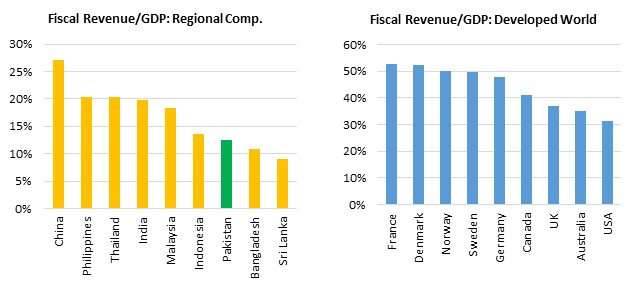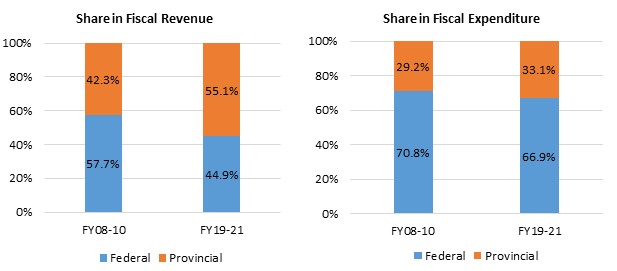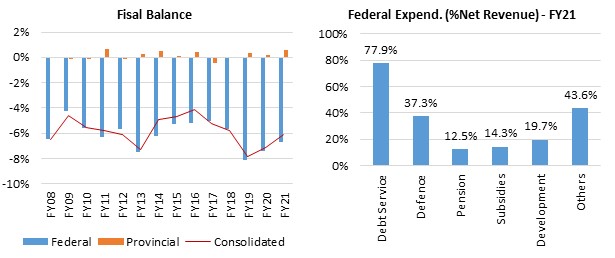Characterised by obstinately high budget deficit and elevated public indebtedness, Pakistan’s fiscal abyss is the ultimate outcome of a toxic blend of faulty regulatory framework, weak political resolve and poor governance. These structural weaknesses have translated into inadequate budgetary resources, unbalanced distribution of revenues/costs, wasteful expenditures and bleeding Public Sector Enterprises (PSEs), which have all put the country on an unsustainable fiscal trajectory.
Pakistan’s current fiscal framework is bound by the 7th National Finance Commission (NFC) award and the 18th constitutional amendment (both done in 2010), which brought about sweeping changes aimed at decentralisation and devolution. However, with politics outweighing economics as the primary motive underlying this structural transformation, the new and constitutionally-protected fiscal order was unbalanced and inflexible with no inbuilt remedial mechanisms.
Taking effect from FY2011, the 7th NFC award increased the aggregate share of provinces in the divisible pool, which comprises nearly all taxes levied and collected by the federal government after deduction of a collection charge, from 45.0% to 57.5%. Moreover, the size of the divisible pool was expanded by reducing the federal collection charge from 5% to 1%, while sales tax on services was removed from the divisible pool and made exclusive domain of the provinces. Federal non-tax revenues in shape of royalties on crude oil and natural gas and Gas Development Surcharge (GDS) remained pass through to provinces based on their respective shares of oil and gas production.
In its July 2017 report on “Fiscal Decentralisation and Macroeconomic Challenges in Pakistan”, the IMF staff provided an assessment of Pakistan’s fiscal framework. The report observed that “the 7th award contributed to substantial vertical fiscal asymmetry” by increasing provinces’ share in fiscal revenues to over 50% but keeping their share in fiscal expenditures at 35% thereby leaving a “significant structural deficit at the federal level”.
In addition to creating vertical asymmetry, the fiscal decentralisation under the 7th award has been unbalanced, according to the IMF report, in several other areas, mainly: 1) non-sharing of costs of electricity and debt which as per constitution are joint responsibility subjects of the centre and the provinces, 2) inherent disincentives for both the provinces and the centre towards mobilising revenues, 3) absence of devolution of resources to the local governments, 4) disconnect between devolution of fiscal resources and expenditures and 5) non-provision of contingencies relating to national emergencies.
The vertical asymmetry of the 7th NFC award became evident soon after its implementation as the very government that negotiated and implemented the award also brought in the GIDC Act in 2011 to generate exclusive revenues for the federal government by sidestepping the divisible pool. However, successive attempts at collecting GIDC were met with legal challenges in courts and declared unconstitutional thereby restricting the federal government’s ability to introduce levies that did not form part of the divisible pool.
Pakistan has one of the lowest fiscal resource mobilisation ratios in the world. According to IMF’s World Economic Outlook (WEO) database for April 2022, Pakistan ranked 180th on a list of 193 countries with total fiscal revenue at 12.5% of GDP in 2021, less than half of the global average of 30% and median of 27%. However, the regional comparison looks less harrowing with Bangladesh and Sri Lanka faring poorly than Pakistan on total fiscal revenue/GDP benchmark.

Over the past 3 years (FY19-21), provinces collected a little over 9% of the consolidated fiscal revenues (equivalent to 1.1% of GDP) but got a resource share (including federal loans and grants) of 55%. On the other hand, provinces shared only 33% of total fiscal expenditures during this period. In the final three years of the previous NFC award (FY08-10), the provinces were allocated a 42% share in fiscal revenues while they accounted for 29% of total fiscal expenditure.

Receiving hefty handouts from the federal government and running up budget surpluses, provinces have limited incentive to expand their own revenue sources. On the other hand, net federal fiscal revenue (after transfers to provinces) is not sufficient to even fully cover debt servicing and defence expenditures. Total federal expenditure in FY2021 was 205% of net federal revenues (after transfers to provinces) with debt service and defence comprising 115%. The federal government bears huge burden of subsidies (predominantly energy and food) and subsistence allowances which primarily benefit provincial populations. In addition, the federal government provides development grants to the provinces.

With large structural deficits, the federal government has faced constant pressure from the IMF under successive programs to increase its revenue collection. Moreover, as provinces retain their respective budget surpluses and do not transfer them to the centre, the consolidated fiscal deficit is not a true representation of the overall fiscal position given a larger deficit at the federal level. By running down accumulated cash balances, the provinces tend to overspend closer to the election cycles which dilutes the federal government’s control over fiscal policy.
Besides the scarcity of fiscal resources, Pakistan has major problems of weak quality of expenditures and poor governance of PSEs. Overstaffing, project cost overruns, hefty pension costs and cash burning PSEs continue to drain huge amounts from the federal budget although pension costs are becoming a challenge for the provinces as well. In addition to the bureaucratic inefficiencies, there are concerns about the transparency of expenditures especially in the provinces.
Pakistan’s current fiscal trajectory is unsustainable and requires an urgent course correction through comprehensive reforms in the current fiscal framework. An immediate engagement between the centre and the provinces on the long overdue fresh NFC award needs to be started. The overarching objective of the next NFC award should be achieving fiscal sustainability through a more balanced distribution of resources and fiscal responsibilities between the centre and the provinces. Provinces should focus on mobilising higher revenues from their own sources as several subjects falling under the provincial domain remain undertaxed. The federal government needs to transfer the burden of subsidies (energy and food) and subsistence allowances to the provinces based on their respective population and consumption shares. Last but not least, the quality and transparency of expenditures and overall governance must be enhanced at all levels of the government.



Comments are closed.